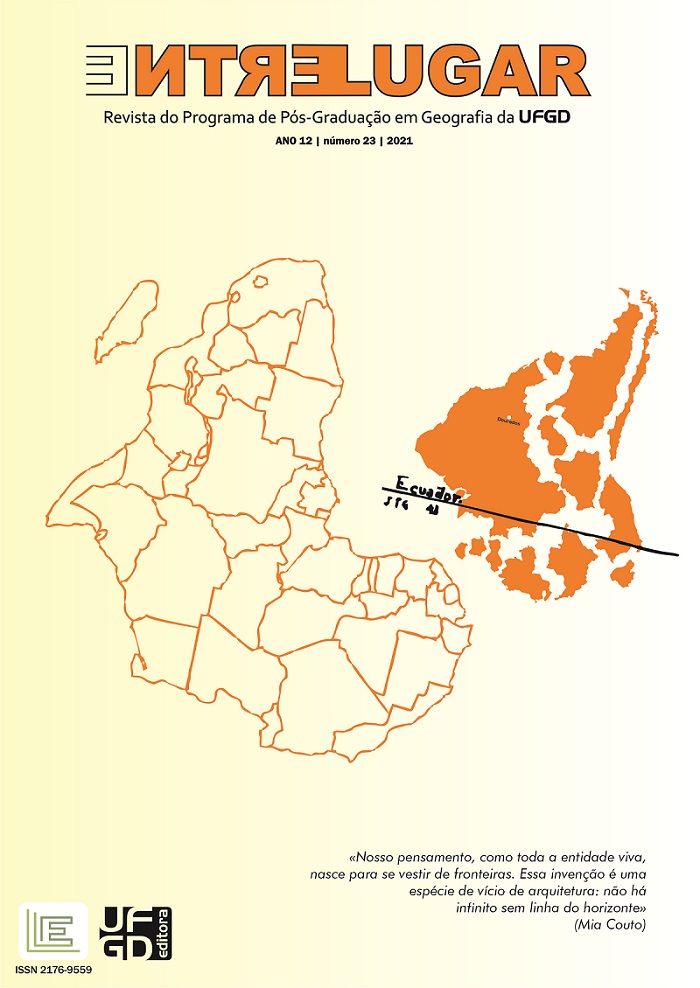Geodiversity and geoturism: a look at the tourist potential of the Moatize distrit in Mozambique
DOI:
https://doi.org/10.30612/el.v12i23.14801Keywords:
Geological diversity. Geoconservation. Geological tourism and local development.Abstract
This research aimed to highlight the importance of Geodiversity for the development of Geotourism, as well as to inventory and evaluate the natural tourist attractions of the Moatize District, in order to realize its potential. The methodological procedures applied to carry out this study are based on bibliographic research, fieldwork, semi-structured and informal interviews; and office work. Likewise, points (tourist attractions) were collected with a GPS receiver and subsequently inserted in an environment of GIS - Geographic Information System (software ArCGIS 10, version ARCMap 10.3) allowing the spatialization of attractions on a map. In the same perspective, the Hierarchical Methodology for Tourist Attractions, exposed by the OMT and adapted by CICATUR, was applied. For the characterization of the potential attractions, a selection was made through field research, which allowed a brief tourist inventory of the place, using the inventory forms of the methodological proposal of the Ministry of Tourism (Brazil, 2006). From the research carried out, the results show the existence of several natural attractions with high potential for the practice of geotourism. However, despite the inestimable potential, it is clear that the attractions are practically unknown to the public, although they are highly confidential. The tourist attractions inventoried in the studied region are strictly linked to the elements of geodiversity, namely: Hydrothermal vents of Nhaondue and Mawhira 1 and 2, respectively; Caves of Nhaondue and Phiriganga, Landscape of the Lookout of the community of Nhaondue, waterfalls of the Moatize River, Monte Zobue, Mushroom Rock and Rock Paintings of Nakalata. With a good structure of these attractions, Moatize will be able to register significant gains in the tourism sector resulting from the demand for its services and/ or tourism products, thus being able to contribute, in the improvement of the living conditions of the local communities and perhaps in the development of the province and the country of general way.
Downloads
References
AGUIAR, Paula. Microorganismos das fontes Hidrotermais Terrestres. 2011. Disponível em: http://siaram.azores.gov.pt. Acesso em: 3 jun. 2020.
BRILHA, José. Património Geológico e Geoconservação: a conservação da Natureza na sua vertente geológica. Editora Palimagem, Lisboa, 2005.
BEEDDIE, P. & HUDSON, S. Emergence of Mountain-based adventure tourism. Annals of Tourism Research, 30 (3), 625-643, 2003.
BERTRAND, G. Cadernos da Terra. Paisagem e Geografia Física Global. USP, São Paulo, 1971.
BOULLÒN, Roberto C. Planejamento do Espaço Turístico. Rio de Janeiro. Editora UERJ, 2001.
BRASIL. Programa de Regionalização do Turismo – Roteiros do Brasil. Ministério do Turismo: Produtos Turísticos. Brasília: 2004.
BRASIL.. Programa de Regionalização do Turismo. Roteirização Turística – Módulo Operacional 07. Ministério do Turismo. Brasília: 2005.
BRASIL. Projeto Inventário da Oferta Turística. Ministério do Turismo: Brasília, 2006.
BUCKLEY, R. Environmental inputs and outputs in ecoturism: geoturism with a positive triple botoom line? 2003. In: Jornal of Ecoturism, 2: 76-82.
CPRM. COMPANHIA DE PESQUISA DE RECURSOS MINERAIS. Geodiversidade. Rio de Janeiro, 2006. Dispo¬nível em: <http://www.cprm.gov.br/publique/Gestao-Territorial/Geodiversidade-162>. Acesso em: 3 jun. 2014.
DANTAS, N. G.; MELO, R. S. Análise da metodologia de hierarquização de atrativos turísticos como instrumento para elaboração de roteiros turísticos no município de Itabaiana (PB ). Caderno Virtual de Turismo, p. 147–163, 2011.
DOWLING, R. & NEWSOME, D. Geoturism: Sustainability, impacts and management. Elsilver, 2006, 352p.
HALL, C. M. Introdution to turism in Australia: Development, Issues and Change, 5th edn. South Melbourne: Pearson Education Austrália, 2007.
HOSE, T. A. European Geoturism- geological interpretation and geoconservation promotion for tourism. In: Barettino D.; Wimbledon W. A. P.; Gallego E. (eds) Geological Heritage: Its Conservation and Management. Madrid, Sociedad Geologica de Espana/Instituto Technologico GeoMineiro de Espana/ProGeo, 2000, 127-146.
JORGE, Maria do Carmo Oliveira & GUERRA, Antônio José Teixeira. Geodiversidade, Geoturismo e Geoconservação: Conceitos, Teorias e Métodos. In: Revista Espaço Aberto, UFRJ, V. 6, N.1, P151-174, 2016.
KUBALIKOVÁ, L. Geomorphosite assessment for geotourism purposes. Czech Journal of Tourism, v. 2, n. 2, p. 80-104, 2013.
MC COOL, S. Mountains and turism: Meeting the chakkenges of sustainability in a messy word. Celebrating Mountains: Proceedings of an International Year of Mountain Conference. Jindabyne, Australia, 2002.
MCT. Plano Estratégico para o Desenvolvimento do Turismo em Moçambique. v. I, n. PEDT II, 2015.
MENESES, Ulpiano T. Bezerra. A paisagem como fato cultural. In: Turismo e Paisagem. USP, São Paulo, Contexto Editora, 2002.
NASCIMENTO, M. A. L. et al. Geoturismo: um novo segmento do turismo no Brasil. Global Tourism, v. 3, n. 2, p. 41-64, 2007. Disponível em:<http://www.periodicodeturismo.com.br/site/artigo/pdf/Geoturismo_um%20novo%20segmento%20do%20turismo%20no%20Brasil.pdf>. Acesso em: 26 de Abril 2020
ROCHA, Sara Sousa Pedro Goulart. Caracterização de Sistemas Hidrotermais de Baixa Entalpia na Ribeira Grande, Ilha de S. Miguel, Açores. Dissertacao de Mestrado. Universidade Nova de Lisboa, Faculdade de Ciência e Tecnologicas, Lisboa, 2011.
TOLEDO, M. Cristina Motta et al. Decifrando a Terra. São Paulo, Oficina de textos, USP, 2000.
TRAVASSOS, Luiz Eduardo Panisset. Glossário conciso e ilustrado de termos cársticos e espeleológicos. Belo Horizonte, PUC Minas, 2015.
TRAVASSOS, Luiz Eduardo Panisset et al. Principios de Carstologia e Geomorfologia Cárstica. Instituto Chico Mendes de Conservação da Biodiversidade- ICMBio, 2019.
Downloads
Published
How to Cite
Issue
Section
License
Autores que publicam nesta revista concordam com os seguintes termos:
- Autores mantém os direitos autorais e concedem à revista o direito de primeira publicação, com o trabalho simultaneamente licenciado sob a Creative Commons Atribuição-NãoComercial-CompartilhaIgual 3.0 Brasil que permitindo o compartilhamento do trabalho com reconhecimento da autoria do trabalho e publicação inicial nesta revista.
- Autores têm autorização para assumir contratos adicionais separadamente, para distribuição não-exclusiva da versão do trabalho publicada nesta revista (ex.: publicar em repositório institucional ou como capítulo de livro), com reconhecimento de autoria e publicação inicial nesta revista.
- Autores têm permissão e são estimulados a publicar e distribuir seu trabalho online (ex.: em repositórios institucionais ou na sua página pessoal) a qualquer ponto antes ou durante o processo editorial, já que isso pode gerar alterações produtivas, bem como aumentar o impacto e a citação do trabalho publicado (Veja O Efeito do Acesso Livre).




